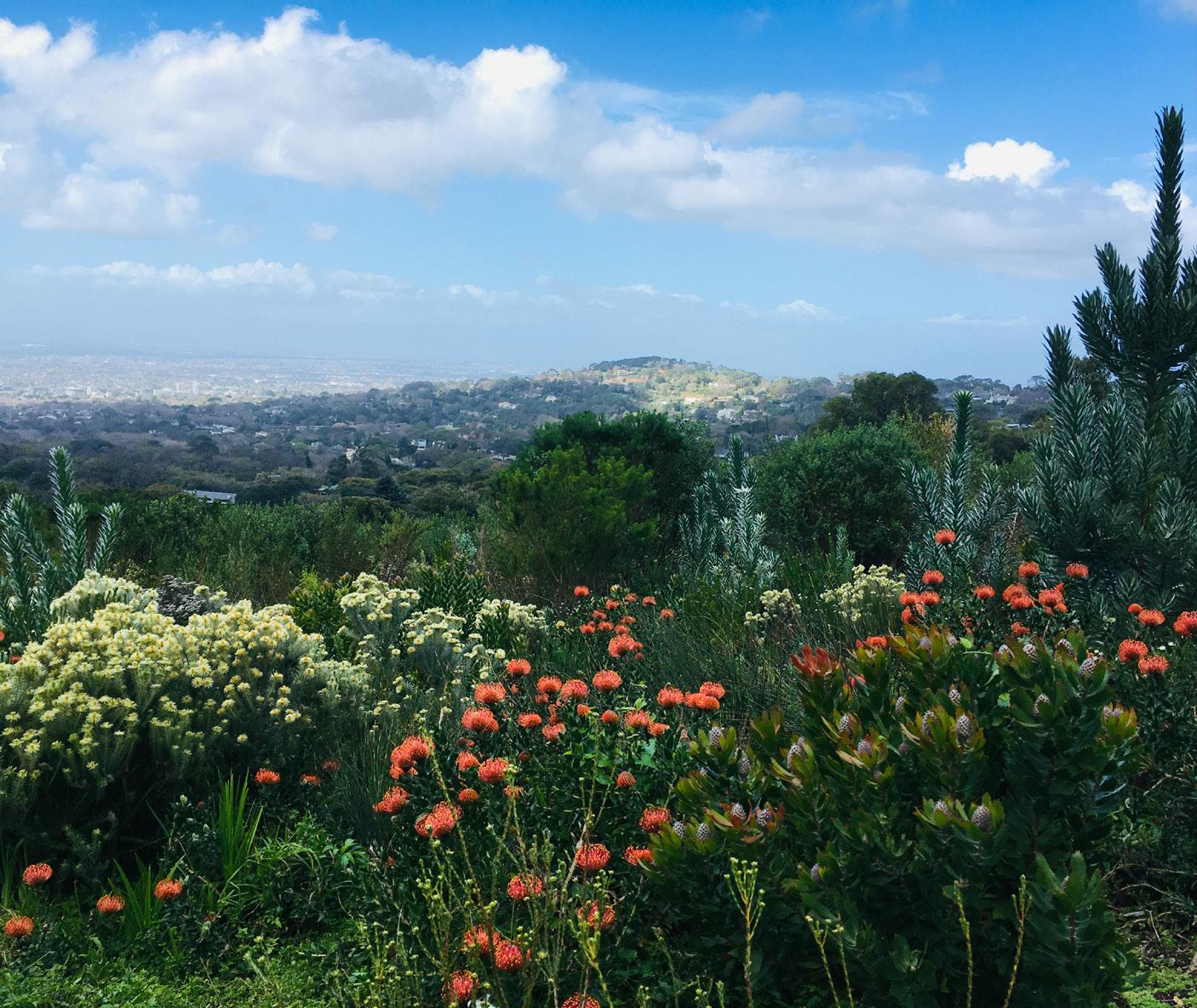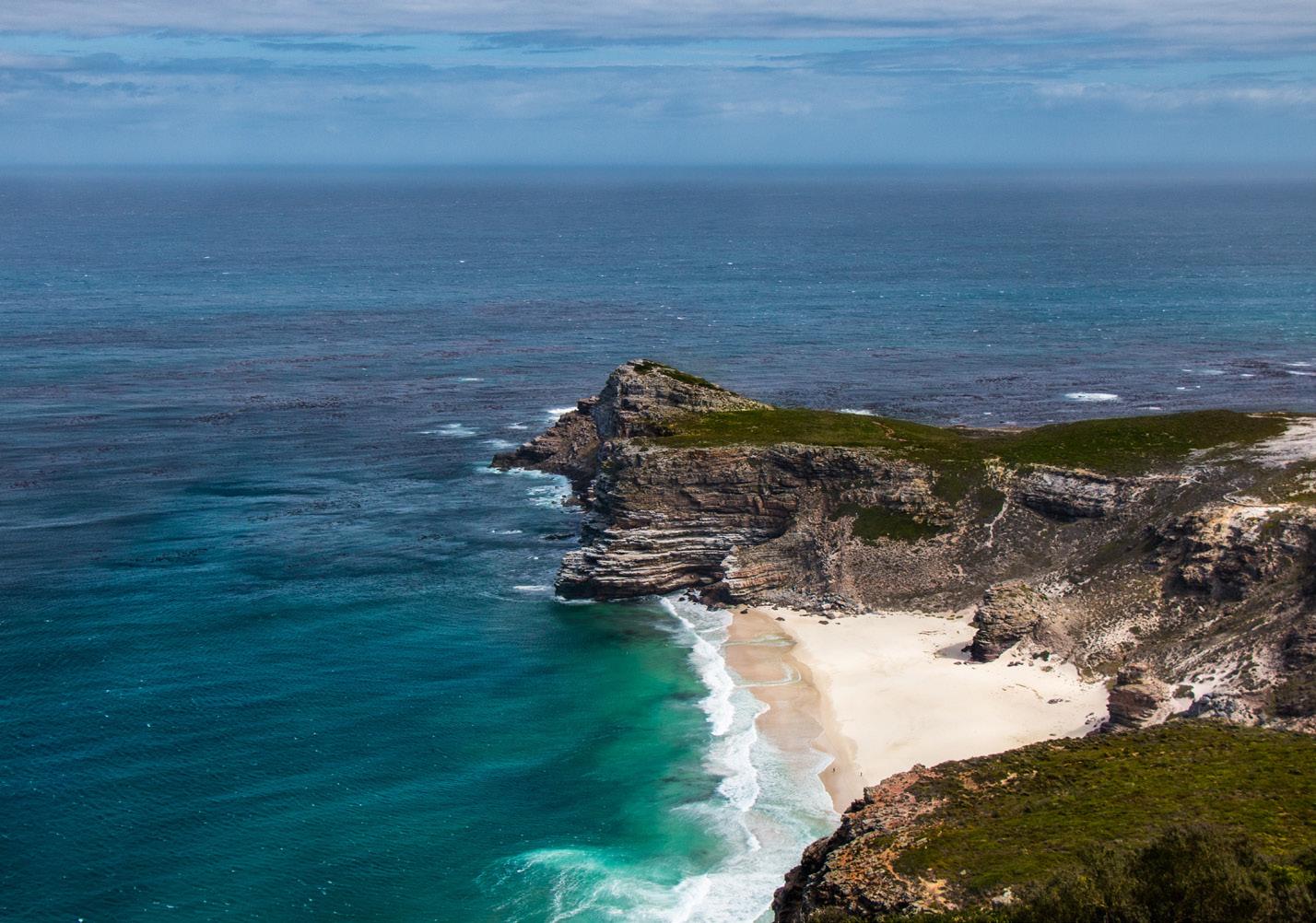
9 minute read
DFFE Focus: Green jobs
DFFE FOCUS
BY JESSIE TAYLOR
Green jobs
Building a workforce to fight the effects of climate change
In a world that is increasingly witnessing the effects of climate change, it’s becoming essential that creating employment opportunities comes at a benefit to the environment.
It’s this sentiment that drives the creation of green jobs in South Africa, through a series of programmes by the Department of Forestry, Fisheries and Environment. However, the programmes are not simply about creating work opportunities, they also aim to protect some of South Africa’s most important environmental resources.
A ROAD MAP TO EMPLOYMENT
Over the last several years, the Department has made a significant contribution to employment creation and skill development opportunities through its environmental sector programmes. The programmes form part of interventions to support the National Development Plan (NDP). A core focus of the NDP is tackling poverty, inequality and unemployment, and it looks to see 11 million jobs created between 2012 and 2030. Department’s green economy interventions aim to support this roadmap, through programmes that create employment and protect the integrity of our environment.
THE DEPARTMENT RUNS THE FOLLOWING PROGRAMMES:
It is a roadmap to a South Africa where all will have water, electricity, sanitation, jobs, housing, public transport, adequate nutrition, education, social protection, quality healthcare, recreation and a clean environment.
WORKING FOR FORESTS
This programme aims to create employment while developing and rehabilitating government-owned plantations, as well as managing them. The programme is centred around more than 100 000 hectares of new afforestation in the Eastern Cape and KwaZulu-Natal.
The afforestation projects address the critical shortages in forest products, such as saw timber, and improve livelihood options for rural communities. Working for Forests looks to fill the shortfall in the supply of woodland and natural forest resources, which incentivises emerging black growers to invest in long-rotation saw timber crops.
WORKING FOR ECOSYSTEMS
With an estimated six million hectares of untransformed land in South Africa having been degraded, the Working on Ecosystem programme looks to restore lands, especially where the dependence on natural resources, high population densities and unplanned extraction and management of natural resources has reduced livelihood options.
The programme is focused on poor, energy and food insecure communities, such as those in the former homelands, who have relied heavily on biomass for survival over many decades. This led to rural communities being caught up in a seemingly ever-worsening poverty-degradation spiral. Many of these areas are inherently attractive, or close or adjacent to an existing national park, and restoring them could increase tourism and recreation business opportunities for local and investors. Working for Ecosystems has the potential to break the poverty cycle, by restoring the social and financial capital of rural communities.
WORKING FOR LAND
South Africa is committed to the United Nations Convention to Combat Desertification, with a long-term strategy to address issues relating to desertification. Part of this strategy is the Working for Land programme, which encourages sustainable landuse practices and promotes resource conservation ethics, through community partnerships. Desertification, along with climate change and the loss of biodiversity, is one of the greatest challenges to sustainable development. Working for Land aims to empower communities to rehabilitate areas of land by planting trees, protecting grasslands, reducing soil erosion due to storms and educating the public on the unsustainable cutting of firewood.
Working for land intends to make more land productive for the communities to sustain their livelihoods, and the programme seeks to address the issues of poverty through job creation by implementing various natural resource rehabilitation and conservation projects.
WORKING FOR WATER
Invasive alien species are causing billions of rands of damage to South Africa’s economy every year. They are the single biggest threat to the country’s biological biodiversity and pose a significant threat to water security. Invasive plants can divert enormous amounts of water from more productive uses and invasive aquatic plants, such as the water hyacinth, affecting agriculture, fisheries, transport, recreation, and water supply.
There are currently around 200 invasive plants in the country.
The fight against invasive alien plants is spearheaded by the Working for Water programme. The programme works in partnership with local communities, providing around 20 000 jobs through short-term contract jobs. The programme includes skills training.

Working for Water has more than 300 projects in all nine provinces and has cleared more than one million hectares of invasive alien plants.
WORKING FOR WETLANDS
Studies in several areas have suggested that between 35% and 60% of South Africa’s wetlands have already been lost or severely degraded. But the Working for Wetlands programme is built on the growing recognition that wetland degradation is not necessarily permanent. Working for Wetlands focuses on the rehabilitation, wise use and protection of wetlands to maximise employment creation, supports small businesses and transfers relevant and marketable skills to beneficiaries.
The programme drives employment through the government’s Expanded Public Works Programme (EPWP), which draws significant numbers of unemployed people into the productive sector of the economy, gaining skills while they work and increasing their capacity to earn income. The programme targets those groups most excluded from the mainstream economy, with particular emphasis on women, youth and people with disabilities.
WORKING ON WASTE
Working on Waste is one of the initiatives by the Department of Environmental Affairs implemented under the auspices of the EPWP. The programme aims for the proactive prevention of pollution, through waste management services. It looks to prevent litter, which could lead to health hazards and environmental degradation.
Ineffective waste management practices can affect the well-being of communities, and often leads to illegal dumping and littering. The programme seeks to ensure that both social and ecological sustainability is achieved through the implementation of sustainable waste management practices.
WORKING ON FIRE
Estimates have calculated that the damage to the forestry industry through the major fires is worth about R3.6-billion, but this could have doubled had it not been for the Working on Fire programme. Working on Fire prevents and controls wildland fires. The programme aims to protect life and property, as well as the environment. The governmentfunded, job creation programme also looks to alleviate poverty. Impact studies looking at the programme have found significant changes to the lives of beneficiaries and their families’ living standards.
Firefighters in Working on Fire are recruited from marginalised communities and trained in fire awareness, education, prevention and suppression skills. These young people form veld and forest firefighting ground crews, stationed at bases around the country to help stop the scourge of wildfires which costs the South African economy billions of rands annually. Working on Fire employs more than 5000 people, all of whom have been fully trained as veld and forest firefighters and are stationed in more than 200 teams throughout the country.
WORKING FOR THE COAST
South Africa’s coastlands regularly feel the effects of inland resource practices. High population densities, construction, mineral exploration and urban expansion can have significant impact on coastal resources, endangering pristine areas along the coastline.
The country’s coastal areas also face the threats of coastal sedimentation, environmental pollution, destruction of coastal habitats, urbanisation, and tourism impacts. The Working for the Coast programme was established to help deal with some of these challenges in line with the Integrated Coastal Management Act. The programme is informed by the EPWP and uses labour-intensive methods in its implementation, to encourage job creation while protecting the country’s coastline.
LOOKING TO THE ECONOMIC FUTURE
The Department’s programmes have had a far-reaching impact. In total, the various programmes have created more than 65 000 job opportunities, of which 34 000 have been full-time employment. Those prioritised for jobs include women, youth and people living with disabilities.
The jobs have been created to fulfil the department’s mandate and have seen 105 wetlands rehabilitated, more than 2 100 kilometres of coastline cleaned, estuaries and dunes rehabilitated, boardwalks constructed, trees planted and the removal of alien species.
Creating these green jobs is essential to support South Africa’s economy and reduce poverty levels in the country, says Deputy Minister of Forestry, Fisheries and the Environment, Hon. Makhotso Magdeline Sotyu.
“[A] critical challenge facing the world and developing countries is the high unemployment rate with associated issues of some citizens being food insecure, especially at the household level. A key issue to be addressed in this regard is the creation of economic and employment opportunities, especially where the majority of the population comprises of the youth,” says Hon. Sotyu. “Social measures and safety nets for the most vulnerable in communities still play a role in alleviating the plight of those who do not have the means of survival. However, putting a heavy burden will be unsustainable on these social support mechanisms without stimulating economic growth and creating economic and employment opportunities.”
Investing in environmental management and integrated development planning will enable the building of a low carbon economy that supports resilient ecosystems and economies. Healthy and intact ecosystems provide more options for responding to climate change, alleviating poverty and building a green economy.
ABOUT THE EXPANDED PUBLIC WORKS PROGRAMME
Created in 2012, the Expanded Public Works Programme (EPWP) is one of the government’s key programmes aimed at providing poverty and income relief through temporary work for the unemployed. EPWP projects employ workers on a temporary or ongoing basis with government, contractors, or other non-governmental organisations. The EPWP also provides training and enterprise development support. The programme employs around 1.4 million people a year, and pays our wages of more than R900-million, according to the State of the Expanded Public Works Programme in South African Cities 2019/20 Report.

The report is created by the South African Cities Network EPWP Reference Group, a peer-based platform that consists of key officials from eight respective cities whose knowledge and experience is used to contribute significantly to job creation in South Africa.
“This positive activity is taking place against a flat economic backdrop: South Africa is currently experiencing year on year GDP growth of only 0,2%... Given this operating environment, the EPWP plays an important role in creating job opportunities in cities for semiskilled and unskilled workers in various sectors for the benefit of the poor and unemployed, especially when coupled with the reduced public-sector wage bill,” said Sithole Mbanga, South African Cities Network CEO.
In the 2019/20 year, there were more than 1500 EPWP projects implemented across the country. The majority of these were in the environment, culture, infrastructure and social sector. More than half of those employed by the programme are youth, while 55% are women. n










